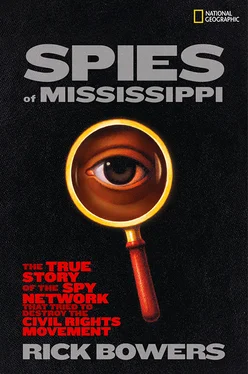Despite the tracks left behind by the anti–civil rights spies and the excellent research and writing on the subject in Mississippi, the story remains largely unknown to the general public. It is usually relegated to a footnote in the history of the civil rights movement.
No longer.
This is how it happened.
 THE GENESIS
THE GENESIS
At noon sharp on a bright, 43-degree day in January 1956, J. P. Coleman placed his right hand on his mother’s Bible and took the oath to become the 51st governor of Mississippi.The 6-foot, 2-inch gentleman farmer, lawyer, and Civil War historian cast an impressive figure as he stood at the podium preparing to deliver his inaugural address. Coleman looked out over the 3,000 people gathered in the public square in the state capital of Jackson. Virtually all the faces looking back at him were white.
A segregationist and skilled public speaker, Coleman launched into his inaugural address, vowing to “maintain the continued separation of the white and Negro races.” But aware that tensions between whites and blacks were threatening to flare into violence in a number of cities and towns across the state, Coleman also warned his audience—including both chambers of the state legislature and the state supreme court—that preserving segregation was “no task for the amateur or the hothead.” When it came to the tense relationship between whites and blacks in Mississippi, Coleman wanted “peace and quiet.” In Mississippi in 1956, that made him a moderate.
Once settled in to the governor’s mansion, Coleman waded through a stream of bills coming to his desk from the state legislature, which was fixated on shoring up the walls of segregation. House Bill 880 caught his eye. It called for the creation of the Mississippi State Sovereignty Commission, a special agency that would preserve the state’s “sovereignty”—that is, its right to govern itself without undue interference from the federal government or private pressure groups. The lawmakers behind the bill had made it clear that sovereignty was really just a high-minded code word for segregation—the official state policy of keeping the races separate and keeping whites in a position of power over blacks. The Commission would be granted extraordinary powers, including the power to investigate private citizens and organizations, to maintain secret files, to force witnesses to testify, and even to make arrests.
From a legal standpoint, Coleman worried that such a potent and secretive investigative agency could trample on the rights of private citizens. From a political standpoint, he knew that those powerful lawmakers would not back down until the bill was signed into law. And from a practical standpoint, he had to admit that having his own operatives to keep an eye on civil rights “agitators” could help to maintain his coveted racial peace and quiet. As the new governor signed the bill, he vowed to contain the agency’s power by surrounding it with moderates like himself, instead of the outspoken, racist politicians and civic leaders he called “fire-eaters.” With the stroke of his pen, the Commission was born. Governor Coleman, despite his reluctance, became the overseer of the state’s new segregation watchdogs.
GROWING OUTRAGE, GROWING BACKLASH
The segregation watchdogs would have plenty to keep an eye on.From Gulfport to Greenville, civil rights activists had stepped up their boycotts, marches, prayer vigils, and demonstrations against segregation and discrimination, inequality and injustice. The catalyst had been the 1954 U.S. Supreme Court ruling in Brown v. Board of Education , which barred segregation in public schools and required states to integrate schools “with all deliberate speed.” The ruling prompted more and more opponents of segregation to join the National Association for the Advancement of Colored People (NAACP), an interracial organization formed in 1909 to advocate for equal rights for African Americans. Now the NAACP was setting up local chapters in cities and towns throughout Mississippi—and the rest of the country—to push for integration.
The growing outrage of blacks was greeted with a growing backlash from many whites. The more extreme opponents of integration called for a campaign of “massive resistance” by white community leaders and ordinary citizens. City leaders barred demonstrations; county sheriffs began jailing activists on trumped-up charges; the Ku Klux Klan awoke from a long slumber with cross burnings, beatings, and even murder.
Thousands of people were joining the newly formed White Citizens’ Council, a self-described civic organization with a stated mission of defending segregation by legal means—and without violence. The movement was inspired by Mississippi Circuit Court Judge Thomas Pickens Brady, who published a handbook entitled Black Monday , which denounced the 1954 Supreme Court ruling, introduced a racist philosophy, and compared black people to cockroaches and chimpanzees. Brady called for the disbandment of the NAACP and proposed radical alternatives to integrated schools, including the abolition of all public schools and even the creation of a separate state for Negroes.
By the time Governor Coleman took office, the state was studded with White Citizens’ Council chapters. Their leaders saturated their community newspapers with pro-segregation messages, advocated for tougher segregation ordinances, supported segregationist political candidates, and fiercely denounced the NAACP by calling it the National Association for the Agitation of Colored People. The Council’s most effective weapon was the economic advantage that middle- and upper-class whites held over the majority of blacks. Council leaders got suspected civil rights sympathizers fired from their jobs, turned down for credit, forced out of business, or evicted from their homes. Behind the scenes, more than a few Council leaders resorted to threats, intimidation, and violence, as they worked hand in hand with the Klan. Critics of the White Citizens’ Council—noting that most of its leaders were respected white businessmen dressed in suits and ties rather than hoods and robes—dubbed the organization the “Country Club Klan.” Liberal journalist Hodding Carter, editor of the crusading Delta Democrat Times , warned that the most extreme white racists would take control of the council. “When the pot boils,” Carter said, “the scum rises to the top.”
Most black Mississippians were not buying segregation, even if they had to keep their views to low whispers to avoid persecution. Many others were voting with their feet by moving north in search of better jobs and more tolerance. Still others, convinced that the entrenched white political class would never give up power, chose to make the best of it in a black-and-white world. Those few subservient blacks who played up to white authority figures in exchange for preferential treatment were branded Uncle Toms, a term drawn from a fictional character in Harriet Beecher Stowe’s novel Uncle Tom’s Cabin. The term, a badge of shame in the black community, suggested that the person was selling out his or her own people.
The Mississippi State Sovereignty Commission was counting on it.
 THE “BIBLE”
THE “BIBLE”
As the tension between the races simmered, Governor Coleman assumed the chairmanship of the board that would oversee the Sovereignty Commission.The 12 board members—including the powerful president of the Mississippi Senate, the speaker of the Mississippi House, and the state attorney general—would provide political cover for the agency’s hidden operations. Once the board was in place, Coleman set up a propaganda unit to wage a war of words against the NAACP. The unit would produce and distribute pro-segregation messages, ultimately compiling a package of press releases, films, speeches, and testimonials that would become known as the “Bible.”
Читать дальше

 THE GENESIS
THE GENESIS THE “BIBLE”
THE “BIBLE”










